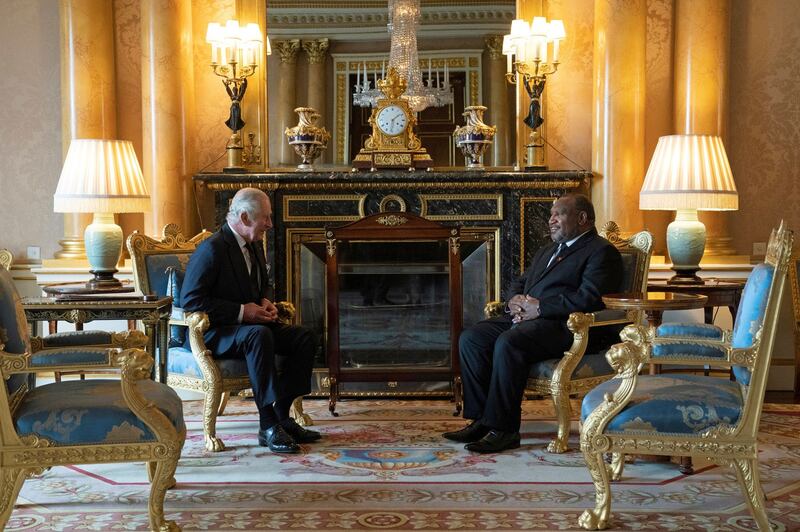Papua New Guinea has begun a review of its system of government that will recommend whether the British monarch should be replaced as head of state and if the prime minister should be directly elected.
Prime Minister James Marape and the Constitutional and Law Reform Commission launched the review Wednesday. It comes months after the most violent national election in the Pacific island country in decades that the U.N. criticized for dozens of deaths and alleged ballot tampering.
“I am treating the review seriously and will give it high priority and support,” Marape said in launching the review. “Above all, democracy and Christianity must be upheld.”
The commission said the review would consider issues including whether Papua New Guinea should have an upper house of parliament; whether the prime minister should have a limit of two terms; whether the prime minister should be directly elected instead of elected by parliament; and whether the British monarch should continue to be head of state.
Papua New Guinea’s ties to the United Kingdom stem from a protectorate that the British declared in the late 19th century. Australia, also a former British colony, was the administrative power from the early 20th century until Papua New Guinea’s independence in 1975.
Australia and the United States are increasingly vying for influence in Papua New Guinea against China. Australia is the largest aid donor to Papua New Guinea while China has achieved prominence in the country with some high-profile infrastructure works.

The commission said the list of issues it would review was not exhaustive and that it would look at other matters as they emerge during the months-long review.
The review already faces criticism as a distraction from other pressing challenges in the economically lagging country. For some prominent Papua New Guineans, it is an opportunity to argue for less democracy as the solution to their country’s problems.
Gabriel Ramoi, a former member of parliament, said the review would be “a waste of time, money and intellectual capital.” He called for the government to focus on economic problems such as runaway inflation and high unemployment.
PNG's challenges
Mountainous and jungle-clad Papua New Guinea is one of the world’s most linguistically diverse nations, with more than 800 indigenous languages. A creole known as Tok Pisin has emerged as a common language for Papua New Guinea’s estimated nine million people, but stability for the country remains elusive.
It grapples with tribal violence and challenges such as corruption, lack of roads and basic healthcare in many regions and limited participation of women in politics. The United Nations estimates that more than half the population lives in severe poverty when income and other standard-of-living factors are taken into account.
Jean Parkop, one of the few female candidates in the country’s 2022 election, said she had doubts about whether the commission’s public consultation would be adequate.
It plans to visit provinces between early March and mid-May and will receive written submissions until the end of June. An online survey for the public to submit views also will be available until June 30.
Not all of Papua New Guinea is connected to the internet and the majority of people in rural areas have no access to it, according to Parkop.
“Will the commission be able to travel the length and breadth of this nation and hear the views of our people in three months,” she said.
”I am also concerned whether the majority of women and people in the rural areas will participate.”
Ted Diro, a former provincial governor and commander in Papua New Guinea’s military, questions whether democracy is the best system for his country. He said the review was timely and necessary.
“I have always maintained that there has never been an honest election since PNG became independent. If we are really serious about the success of our nation we need to be honest,” Diro said.
“Maybe rather than democracy we need a guided democracy in future. We must ensure that there is peace and security in our country and region,” he said.
BenarNews is an RFA-affiliated news service.
